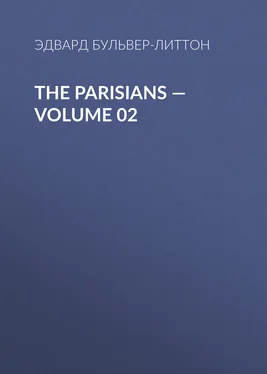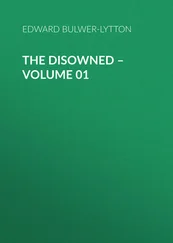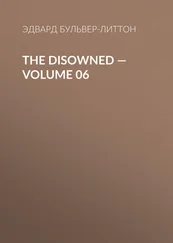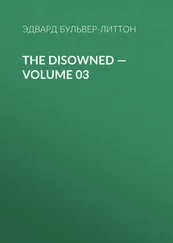Эдвард Бульвер-Литтон - The Parisians — Volume 02
Здесь есть возможность читать онлайн «Эдвард Бульвер-Литтон - The Parisians — Volume 02» — ознакомительный отрывок электронной книги совершенно бесплатно, а после прочтения отрывка купить полную версию. В некоторых случаях можно слушать аудио, скачать через торрент в формате fb2 и присутствует краткое содержание. Жанр: foreign_prose, literature_19, Европейская старинная литература, foreign_antique, на английском языке. Описание произведения, (предисловие) а так же отзывы посетителей доступны на портале библиотеки ЛибКат.
- Название:The Parisians — Volume 02
- Автор:
- Жанр:
- Год:неизвестен
- ISBN:нет данных
- Рейтинг книги:5 / 5. Голосов: 1
-
Избранное:Добавить в избранное
- Отзывы:
-
Ваша оценка:
- 100
- 1
- 2
- 3
- 4
- 5
The Parisians — Volume 02: краткое содержание, описание и аннотация
Предлагаем к чтению аннотацию, описание, краткое содержание или предисловие (зависит от того, что написал сам автор книги «The Parisians — Volume 02»). Если вы не нашли необходимую информацию о книге — напишите в комментариях, мы постараемся отыскать её.
The Parisians — Volume 02 — читать онлайн ознакомительный отрывок
Ниже представлен текст книги, разбитый по страницам. Система сохранения места последней прочитанной страницы, позволяет с удобством читать онлайн бесплатно книгу «The Parisians — Volume 02», без необходимости каждый раз заново искать на чём Вы остановились. Поставьте закладку, и сможете в любой момент перейти на страницу, на которой закончили чтение.
Интервал:
Закладка:
Three years went by, passed chiefly in England, partly in travel; and at the age of thirty, Graham Vane was still one of those of whom admirers say, "He will be a great man some day;" and detractors reply, "Some day seems a long way off."
The same fastidiousness which had operated against that entrance into Parliament, to which his ambition not the less steadily adapted itself, had kept him free from the perils of wedlock. In his heart he yearned for love and domestic life, but he had hitherto met with no one who realized the ideal he had formed. With his person, his accomplishments, his connections, and his repute, he might have made many an advantageous marriage. But somehow or other the charm vanished from a fair face, if the shadow of a money-bag fell on it; on the other hand, his ambition occupied so large a share in his thoughts that he would have fled in time from the temptation of a marriage that would have overweighted him beyond the chance of rising. Added to all, he desired in a wife an intellect that, if not equal to his own, could become so by sympathy,—a union of high culture and noble aspiration, and yet of loving womanly sweetness which a man seldom finds out of books; and when he does find it, perhaps it does not wear the sort of face that he fancies. Be that as it may, Graham was still unmarried and heart-whole.
And now a new change in his life befell him. Lady Janet died of a fever contracted in her habitual rounds of charity among the houses of the poor. She had been to him as the most tender mother, and a lovelier soul than hers never alighted on the earth. His grief was intense; but what was her husband's?—one of those griefs that kill.
To the side of Richard King his Janet had been as the guardian angel. His love for her was almost worship: with her, every object in a life hitherto so active and useful seemed gone. He evinced no noisy passion of sorrow. He shut himself up, and refused to see even Graham. But after some weeks had passed, he admitted the clergyman in whom on spiritual matters he habitually confided, and seemed consoled by the visits; then he sent for his lawyer and made his will; after which he allowed Graham to call on him daily, on the condition that there should be no reference to his loss. He spoke to the young man on other subjects, rather drawing him out about himself, sounding his opinion on various grave matters, watching his face while he questioned, as if seeking to dive into his heart, and sometimes pathetically sinking into silence, broken but by sighs. So it went on for a few more weeks; then he took the advice of his physician to seek change of air and scene. He went away alone, without even a servant, not leaving word where he had gone. After a little while he returned, more ailing, more broken than before. One morning he was found insensible,—stricken by paralysis. He regained consciousness, and even for some days rallied strength. He might have recovered, but he seemed as if he tacitly refused to live. He expired at last, peacefully, in Graham's arms.
At the opening of his will it was found that he had left Graham his sole heir and executor. Deducting government duties, legacies to servants, and donations to public charities, the sum thus bequeathed to his lost wife's nephew was two hundred and twenty thousand pounds.
With such a fortune, opening indeed was made for an ambition so long obstructed. But Graham affected no change in his mode of life; he still retained his modest bachelor's apartments, engaged no servants, bought no horses, in no way exceeded the income he had posesssed before. He seemed, indeed, depressed rather than elated by the succession to a wealth which he had never anticipated.
Two children had been born from the marriage of Richard King: they had died young, it is true, but Lady Janet at the time of her own decease was not too advanced in years for the reasonable expectation of other offspring; and even after Richard King became a widower, he had given to Graham no hint of his testamentary dispositions. The young man was no blood-relation to him, and naturally supposed that such relations would become the heirs. But in truth the deceased seemed to have no blood- relations: none had ever been known to visit him; none raised a voice to question the justice of his will.
Lady Janet had been buried at Kensal Green; her husband's remains were placed in the same vault.
For days and days Graham went his way lonelily to the cemetery. He might be seen standing motionless by that tomb, with tears rolling down his cheeks; yet his was not a weak nature,—not one of those that love indulgence of irremediable grief. On the contrary, people who did not know him well said "that he had more head than heart," and the character of his pursuits, as of his writings, was certainly not that of a sentimentalist. He had not thus visited the tomb till Richard King had been placed within it. Yet his love for his aunt was unspeakably greater than that which he could have felt for her husband. Was it, then, the husband that he so much more acutely mourned; or was there something that, since the husband's death, had deepened his reverence for the memory of her whom he had not only loved as a mother, but honoured as a saint?
These visits to the cemetery did not cease till Graham was confined to his bed by a very grave illness,—the only one he had ever known. His physician said it was nervous fever, and occasioned by moral shock or excitement; it was attended with delirium. His recovery was slow, and when it was sufficiently completed he quitted England; and we find him now, with his mind composed, his strength restored, and his spirits braced, in that gay city of Paris; hiding, perhaps, some earnest purpose amid his participation in its holiday enjoyments. He is now, as I have said, seated before his writing-table in deep thought. He takes up a letter which he had already glanced over hastily, and reperuses it with more care.
The letter is from his cousin, the Duke of Alton, who had succeeded a few years since to the family honours,—an able man, with no small degree of information, an ardent politician, but of very rational and temperate opinions; too much occupied by the cares of a princely estate to covet office for himself; too sincere a patriot not to desire office for those to whose hands he thought the country might be most safely entrusted; an intimate friend of Graham's. The contents of the letter are these:—
MY DEAR GRAHAM,—I trust that you will welcome the brilliant opening into public life which these lines are intended to announce to you. Vavasour has just been with me to say that he intends to resign his seat for the county when Parliament meets, and agreeing with me that there is no one so fit to succeed him as yourself, he suggests the keeping his intention secret until you have arranged your committee and are prepared to take the field. You cannot hope to escape a contest; but I have examined the Register, and the party has gained rather than lost since the last election, when Vavasour was so triumphantly returned. The expenses for this county, where there are so many outvoters to bring up, and so many agents to retain, are always large in comparison with some other counties; but that consideration is all in your favour, for it deters Squire Hunston, the only man who could beat you, from starting; and to your resources a thousand pounds more or less are a trifle not worth discussing. You know how difficult it is nowadays to find a seat for a man of moderate opinions like yours and mine. Our county would exactly suit you. The constituency is so evenly divided between the urban and rural populations, that its representative must fairly consult the interests of both. He can be neither an ultra-Tory nor a violent Radical. He is left to the enviable freedom, to which you say you aspire, of considering what is best for the country as a whole.
Читать дальшеИнтервал:
Закладка:
Похожие книги на «The Parisians — Volume 02»
Представляем Вашему вниманию похожие книги на «The Parisians — Volume 02» списком для выбора. Мы отобрали схожую по названию и смыслу литературу в надежде предоставить читателям больше вариантов отыскать новые, интересные, ещё непрочитанные произведения.
Обсуждение, отзывы о книге «The Parisians — Volume 02» и просто собственные мнения читателей. Оставьте ваши комментарии, напишите, что Вы думаете о произведении, его смысле или главных героях. Укажите что конкретно понравилось, а что нет, и почему Вы так считаете.












